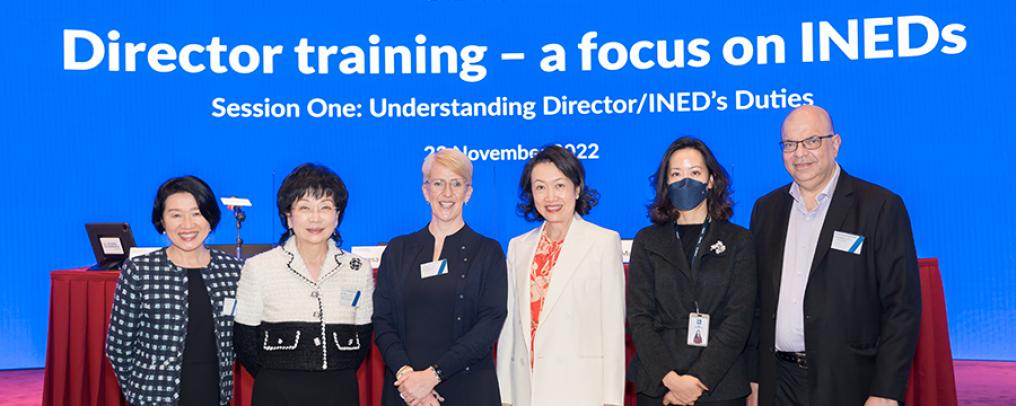
Anti-corruption policies, whistleblowing and ethics training
The latest guidance from the Institute's Ethics, Bribery and Corruption Interest Group is intended to broaden awareness of key social aspects of Hong Kong’s ESG regulatory regime.
In November 2022, the Stock Exchange of Hong Kong Ltd (the Exchange) released the findings of its latest review of issuers’ ESG disclosures – 2022 Analysis of ESG Practice Disclosure (the 2022 Review). The 2022 Review found that listed issuers have generally responded positively to the new requirements of the Exchange’s ESG Reporting Guide (ESG Guide), which became effective in July 2020.
The 2022 Review found that there was a high level of compliance with the new requirements of the ESG Guide (Appendix 27 of Main Board Listing Rules) relating to governance and environmental matters. Over 95% of issuers, for example, disclosed their boards’ oversight and management approach to ESG. Moreover, 85% of issuers made disclosures relating to climate change – including consideration of significant climate-related risks and mitigation measures, the setting of environmental targets, and reporting on Scope 1 and Scope 2 greenhouse gas emissions.
These relatively high levels of compliance in the ‘E’ and ‘G’ aspects were not matched, however, in the ‘S’ aspects. The 2022 Review found the social aspects of ESG were generally subject to lower compliance levels among the sample reports reviewed. In this context, the latest guidance from the Institute's Ethics, Bribery and Corruption Interest Group – Anti-corruption Policies and Ethics Training Disclosure in Environmental, Social and Governance Report (EB&C Guide) – is designed to assist governance professionals in ensuring compliance with key social aspects of Hong Kong’s ESG regulatory regime – namely, those relating to anti-corruption policies, whistleblowing and ethics training.
The increased regulatory focus on the social aspects of ESG
The 2020 upgrade of the ESG Guide was not only targeted at improving issuers’ disclosure and performance in environmental aspects. Indeed, the ESG Guide was amended to:
- upgrade the disclosure obligation of all social key performance indicators (KPIs) from voluntary to ‘comply or explain’
- introduce new KPIs in respect of supply chain management (practices to identify environmental and social risks along the supply chain, and practices to promote environmentally preferable products and services when selecting suppliers), and
- introduce a new KPI regarding anti-corruption training provided to directors and staff.
Regarding point 3 above, the 2022 Review commented that, while a majority of sample issuers disclosed that they had provided anti-corruption training to directors and staff, the disclosures generally lacked detail. ‘Anti-corruption training is crucial to promote high ethical standards and boost investors’ confidence. Issuers should include information on the scope and method of the training, the audience, as well as the frequency of the training provided,’ the 2022 Review stated.
Anti-corruption policies
The EB&C Guide was published in two parts in January this year. Part 1 focuses on anti-corruption policies, while Part 2 focuses on whistleblowing policies and ethics training. It emphasises that effective anti-corruption practices are an essential part of good governance and that governance professionals, in particular company secretaries, play a key role in ensuring that listed issuers have a robust anti-corruption system.
‘A robust anti-corruption system forms a vital part of good corporate governance, which is essential to fostering sustainable investment, economic growth and social development,’ the EB&C Guide states.
It also clearly sets out the current regulatory requirements in Hong Kong. Since the latest upgrade of the ESG Guide, listed issuers are obligated, on a comply-or-explain basis, to disclose:
- concluded legal cases regarding corrupt practices brought against the issuer or its employees and the outcome
- corruption preventive measures and whistleblowing procedures, and
- anti-corruption training provided to directors and staff.
In 2022, a new Code Provision was introduced to Hong Kong’s Corporate Governance Code (CG Code), Appendix 14 of the Main Board Listing Rules, requiring all listed companies to establish anti-corruption and whistleblowing policies and procedures encouraging stakeholders to raise concerns about improprieties such as bribery.
The EB&C Guide also makes the point that anti-corruption policies should demonstrate top management commitment. ‘A top-down approach can effectively demonstrate management’s commitment to business ethics. The tone at the top sets forth the company’s values and ethical climate,’ the EB&C Guide states.
Top management should also lead by example, however. Their behaviour should demonstrate their commitment to ethical business practices and decisions when discharging their duties.
Anti-corruption policies should include a clear statement of the company’s policy against corrupt practices, with reference to the Prevention of Bribery Ordinance and any anti-bribery laws applicable to the company. Such a statement may include prohibition of illegal acceptance and offering of advantages and zero tolerance to malpractice.
Perhaps less well recognised is the need for anti-corruption policies to include integrity requirements for a company’s personnel. The company may also consider including suitable probity requirements for major contractors and partners.
Whistleblowing policies
As mentioned above, all listed companies in Hong Kong are required to establish whistleblowing policies and procedures encouraging stakeholders to raise concerns about improprieties such as bribery. The CG Code (Code Provision D.2.6) states that ‘The issuer should establish a whistleblowing policy and system for employees and those who deal with the issuer (for example customers and suppliers) to raise concerns, in confidence and anonymity, with the audit committee (or any designated committee comprising a majority of independent non-executive directors) about possible improprieties in any matter related to the issuer.’
The CG Code (Code Provision D.3.7) also states that the terms of reference of the audit committee should require it to review arrangements employees of the issuer can use, in confidence, to raise concerns about possible improprieties in financial reporting, internal control or other matters. The audit committee should also ensure that proper arrangements are in place for fair and independent investigation of these matters and for appropriate follow-up action.
The EB&C Guide emphasises that whistleblowing policies should include a statement from the top about the company’s commitment to high probity standards and ethical business practices, and encouraging the reporting of concerns about any actual or suspected misconduct or malpractice in relation to the organisation by employees and external parties.
As with anti-corruption policies, whistleblowing policies should cover employees at all levels and other stakeholders who might be victims of staff misconduct such as business counterparts, for example suppliers.
Organisations should ensure that they establish appropriate reporting channels, bearing in mind that reports may be made against staff members of different levels, including senior management. Organisations are also responsible for ensuring that these reporting channels are well known to all stakeholders.
Whistleblowing policies should also include a statement pledging confidentiality of whistleblowers’ identities and the details of their reports. Persons handling such reports need to keep all related information confidential, except on a need-to-know basis. Policies should also make clear the measures in place to protect against the unfair dismissal, victimisation or unwarranted disciplinary action against bona fide whistleblowers.
The EB&C Guide also emphasises the need for regular reviews of whistleblowing policies.
Ethics training
The EB&C Guide emphasises that ethics training is indispensable to an effective anti-corruption system. Such training should be provided to all levels of personnel in the company, including board members, and should cover the areas set out below.
- Legal and regulatory requirements. The training should broaden awareness of relevant anti-bribery laws, including the Prevention of Bribery Ordinance, and other legal and regulatory requirements, such as those of the Listing Rules, against malpractice.
- Ethical standards and management’s commitment. The training should communicate the guidelines and objectives of the anti-corruption policy and demonstrate management’s determination to include ethics as an integral part of business practice.
- Corruption risks assessment. The training should enhance vigilance against the risks and impacts of corruption in the key operations of the company, addressing common corruption pitfalls and ethical challenges such as the conflicts of interest that staff may face in workplace, and providing guidance on how to handle these issues properly.
- Case studies and analysis. The training should develop a better understanding of integrity issues through the use case studies and scenarios.
- Skills to handle ethical challenges. The training should develop the relevant skills and knowledge staff members need to handle ethical dilemmas at work.
- Management skills to detect warning signs. The training should foster management skills in creating an environment conducive to discussion of ethical issues can facilitate managerial staff to perform their gatekeeping role.
In addition, ethics training should not only be provided as part of staff induction programmes – regular training to sustain corruption prevention awareness and to update staff of the latest risks or changes to legal and regulatory requirements are essential.
Conclusion
Hong Kong’s ESG regulatory regime continues to evolve and the EB&C Guide emphasises the need for governance professionals, especially company secretaries, to keep themselves up to date with the latest developments. This does not only mean staying informed about changes in anti-corruption laws, rules and regulations, but also the rising integrity expectations of investors and the public.
Company secretaries will also be closely involved in ensuring that the board and all levels of staff receive regular ethics training and updates of regulatory developments in relation to ESG standards. They will also be key players in developing and sustaining a sound and effective corporate governance framework, comprising comprehensive anti-corruption and whistleblowing policies and an effective ethics training programme.
More information is available on the website of the Hong Kong Business Ethics Development Centre of the Independent Commission Against Corruption: https://hkbedc.icac.hk. The 2022 Analysis of ESG Practice Disclosure is available on the Hong Kong Exchanges and Clearing Ltd website: www.hkex.com.hk.
SIDEBAR: Credits
The Institute would like to thank the Hong Kong Business Ethics Development Centre of the Independent Commission Against Corruption as author of the guidance note reviewed in this article. The members of the Institute’s Ethics, Bribery and Corruption Interest Group are Dr Brain Lo FCG HKFCG (Chairman), Jeremy Birch, Mary Lau, Michael Chan, Ralph Sellar and William Tam ACG HKACG. Institute Deputy Chief Executive, Mohan Datwani FCG HKFCG(PE), serves as Secretary to the Institute’s Interest Groups. If you have any comments and/or suggestions relating to the Institute’s Interest Groups, he can be contacted at: mohan.datwani@hkcgi.org.hk.
SIDEBAR: Guidance round-up 2022
2022 was a busy year for the Institute’s thought leadership and guidance note work. In addition to new guidance from the Institute’s existing Interest Groups, the year also saw the creation of a new Interest Group dedicated to wealth management issues. 2022 also saw the launch of a series of five interviews with practitioners working for listed companies in sectors with high exposure to climate change risks and the transition to a lower-carbon economy. These sectors, including finance, energy and transport, have benefited from supplemental guidance on climate change and sustainability disclosures developed by the Task Force on Climate-related Financial Disclosures. The series (Climate Change and Sustainability – ESG Best Practices Brought to You from the Boardroom) enabled practitioners in these sectors to share insights on climate change, ESG and sustainability issues.
January
Ethics, Bribery and Corruption Guidance Notes (eighth and ninth issues) – ethical value, fraud prevention and internal controls in relation to digital transformation
March
Company Law Guidance Note (sixth issue) – share repurchases by a Hong Kong company
Guidance Note on ESG and Climate Change – assisting governance professionals in their board advisory roles in relation to ESG and climate change
Guidance on Meeting Arrangements– pertinent issues for the reference of governance professionals in relation to meeting arrangements
May
Guidance on Meeting Arrangements – an update to the March guidance note
June
Public Governance Guidance Note (eighth issue) – an introduction for tax-exempt charities to the revised tax guide on national security concerns issued by the Inland Revenue Department
Company Law Guidance Note (seventh issue) – convening general meetings with disputing shareholders
General Questions Raised to Privacy Commissioner – the retention period and consents for customer due diligence information and making up of the significant controllers’ register ESG Interviews with Hong Kong Listed Companies (Part 1) – interview with Kenny Luo Nan, General Manager, Board Secretary and Company Secretary, Bank of China (Hong Kong) Ltd
ESG Interviews with Hong Kong Listed Companies (Part 2) – interview with Edith Shih FCG(CS, CGP) HKFCG(CS, CGP)(PE), Executive Director and Company Secretary, and Member of the Sustainability Committee, CK Hutchison Holdings Ltd, and Past International President andInstitute Past President
July
Competition Law Guidance Note (eighth issue) – the Hong Kong Competition Commission’s first action against ‘facilitators’ of a cartel (the tourist attraction tickets case)
ESG Interviews with Hong Kong Listed Companies (Part 3) – interview with Adrian Cheng Chi-Kong, Chief Executive Officer, and Chairman, Sustainability Committee, New World Development Company Ltd
August
Governance-related Matters for Hong Kong Start-ups – best practice governance recommendations for start-ups
ESG Interviews with Hong Kong Listed Companies (Part 4) – interview with Gillian Meller FCG HKFCG(PE) Institute Immediate Past President and Ex-officio, and Legal and Governance Director, MTR Corporation Ltd, and Jessica Chan, Head of Sustainability, MTR Corporation Ltd
September
Public Governance Guidance Note (ninth issue) – sustainability issues for NGOs
ESG Interviews with Hong Kong Listed Companies (Part 5) – interview with David Simmonds FCG HKFCG, Institute Vice-President and Chairman, Membership Committee, and Chief Strategy, Sustainability & Governance Officer, CLP Holdings Ltd
October
Competition Law Guidance Note (ninth issue) – practical tips for dealing with pecuniary penalties in the context of competition law enforcement in Hong Kong
Company Law Guidance Note (eighth issue) – Companies Ordinance provisions for a new inspection regime to enhance privacy rights of directors and other officers (phase 2 implementation)
November
Securities Law and Regulation Guidance Note (sixth issue) – the Stock Exchange of Hong Kong’s new Cooperation Guidance and updated Sanctions Statement
December
Wealth Management Guidance Note (first issue) – refinement to foreign-sourced income exemption regime
Technology Guidance Note (seventh issue) – data breach reporting
The above guidance notes are available in the Thought Leadership section of the Institute’s website: www.hkcgi.org.hk.


